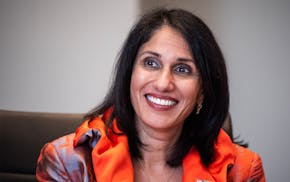Governments fell apart in the past couple of months in Canada, France, Germany, Japan and South Korea. So, hey, why not Minnesota?
OK, that's either an exaggeration or too early.
After the November election produced about as even a split between political parties as possible, legislators are not playing nice. They are going to court over election results to determine control of the Minnesota House. Some may not even show up at Tuesday's opening of the 2025 session.
There's good news, though, for those of us who care more about our money than legislators' politics. Top lawmakers in recent weeks have told various news outlets they don't plan to raise Minnesotans' taxes.
The leaders of the tax-writing committees, Ann Rest in the Senate and Greg Davids in the House, told me two big uncertainties stand in the way of tax legislation this year.
The first is the state's fiscal shape heading into the 2026-27 biennium, which begins July 1. There will be more clarity on that next month when an updated budget outlook is released. One in December estimated a 1% revenue surplus, or about $600 million on a projected general budget of $67 billion.
The second is federal tax policy, which is up in the air because of the expiration of the 2017 tax bill, called the TCJA, short for Tax Cuts and Jobs Act, later this year. Minnesota is one of the states that bases much of its tax rules on the nation's.
"The most important consideration at this point is a very cautionary note about how federal changes to tax laws are going to have an impact on states like Minnesota that are highly conforming," said Rest, a New Hope DFLer.
"I've always been very big on conforming with the feds. It just makes a lot of people's lives a lot easier," said Davids, the Preston Republican who has led the House Tax Committee in the past. Depending on the outcome of the shenanigans in the House, he'll either lead the committee this spring or share power with Rep. Aisha Gomez, a Minneapolis DFLer.
Conforming to tax rules with the federal government's is efficient for both the state government and taxpayers. The issue now is Donald Trump during the campaign promised new deductions and incentives to voters, any of which could dramatically change Minnesota's tax base and the state's future revenue.
For instance, if he and Congress restored the federal deduction on state and local taxes, that would create a lower taxable income for a significant number of Minnesotans. In that case, the state would have to adjust to a smaller tax base. Lawmakers would then have to decide whether to change rates to preserve revenue or lower spending, since the state's budget must be balanced.
Voters elected Rest to the Legislature in 1984, and Davids in 1991, making them two of the longest-serving members. Both have a keen grasp on the intricacies of tax policy and a record of working with the other side. We spoke before the rhetoric from House leaders grew so heated, but both of them expressed worry about the divisiveness emerging in the Capitol.
Davids, who survived a primary challenge from the right earlier this year, told me he saw a bright side in the prospect of shared governance in the House.
"I got to thinking about it and thought, 'You know what? We may actually have to talk to each other,'" Davids said. "I thought that would be really cool."
Rest said she thought the best step the two parties could take would be to agree that the first piece of legislation this year would be a bonding bill. The Legislature over the last few sessions has gotten out of step with its routine capital spending, which has disrupted communities around Minnesota.
"That's my personal preference to show people we can get something done," Rest said. "If we can do that, then we can live with equal numbers of Republicans and Democrats on either side."
DFLers' trifecta in 2023 and 2024 rested on a one-vote advantage in the Senate. With that tight margin remaining, voters in November changed the composition of the House, giving each party 67 seats.
Then, the DFL winner in a Roseville district turned out to not live in it. A special election later this month will settle that seat, likely for the DFL. GOP leaders, led by Rep. Lisa Demuth of Cold Spring, are trying to grab majority control now and hang on to it through the full two-year legislative cycle. Republicans also cite an ongoing dispute over results in a Shakopee district where a DFLer was declared the victor.
It's hard to blame Republicans after the DFL iced them out over the last couple of years.
With little debate, DFLers in 2023 passed the largest increase in state spending since the 1970s. The general budget leapt from $27 billion to $33 billion a year, not counting one-time items. The jump was made possible because the state's revenue surprisingly surged in 2021 and 2022 due to gains in Minnesotans' investment income and the growth of corporate profits nationwide. Those gains never fell back, which means that more recent incremental increases to state revenue have happened from a higher base.
Minnesotans are accustomed to state government growing at a faster rate than the state economy. The difference is usually a few percentage points. Two years ago, it was 34 percentage points. Minnesota's 2024-25 biennium general spending is 36% larger than 2022-23, while state GDP growth swings between 1% and 2%.
The news out of the State Capitol since the election has been about special election lawsuits, fraud investigations or ideas for a tax cut set against the needs of special education students and old people.
No one talks about what size Minnesota's government should be. I guess they all assume the money is there.

Ramstad: Minneapolis' Camden neighborhood is rising. Houston White wants to keep it that way.

Ramstad: Minnesota's big businesses are in crisis with a common problem

Ramstad: No business can 'eat' all the tariffs, not even Walmart

Ramstad: Donaldson is protected from tariff chaos after expanding globally the right way


